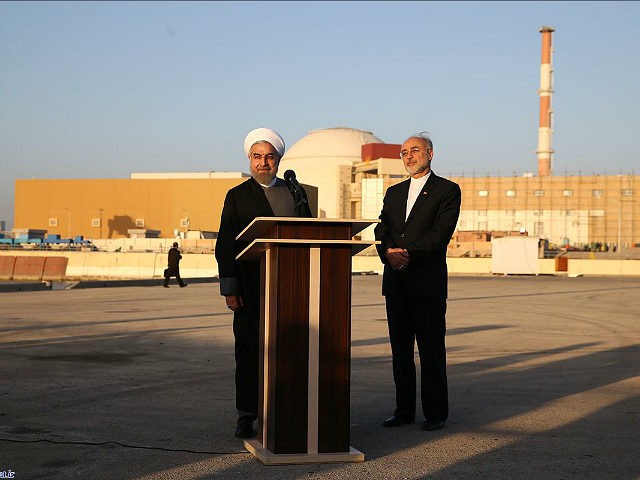Despite some last-minute drama, the Trump State Department decided on Monday to certify that Iran is complying with the terms of the nuclear deal, formally known as the Joint Comprehensive Plan of Action (JCPOA).
State Department review and certification are required every 90 days, making this the second certification from the Trump administration.
Writing at Bloomberg View, Eli Lake reports that President Trump came “very close to killing the nuclear deal” by directing Secretary of State Rex Tillerson not to issue the routine certification of compliance. More specifically, if the State Department withheld certification, Congress would have been granted a 60-day window in which it could have voted to reimpose sanctions that were lifted by the nuclear deal or nullify the deal in its entirety.
“The predicament, according to administration officials, was that Congress (not to mention the other signatories to the seven-party agreement) was not prepared,” Lake writes. “Trump had yet to even put forward a broader Iran policy. What’s more, the U.S. intelligence community feels that Iran is pushing the edges, but overall is in compliance Iran deal.”
This would suggest Trump could make a more determined effort to kill the deal during a future 90-day review. The New York Times reports that Trump argued with his national security team for hours about certifying compliance and told them in frustration that he was not willing to continue issuing those certifications indefinitely.
However, Lake notes that some top officials have argued that U.S. concessions were all front-loaded in the deal, while Iran has obligations stretching over the next decade, so nullifying the deal with the compliance mechanism might hurt the United States more than Iran.
That argument is unlikely to sit well with President Trump and other opponents of the JCPOA, who have argued since the beginning that it was badly negotiated and more advantageous for Iran than the United States and its allies.
They will also find it irritating that Iran is increasingly bold about accusing the U.S. of failing to honor its end of the deal, turning the JCPOA into an unlimited tool for Iran to control American behavior. The essential distillation of Iran’s running complaint is that nearly all criticism and economic pressure from the United States is a violation of the commitment President Barack Obama made to restore Iran’s economy and nourish international trade with the formerly isolated country.
The Trump administration may have signed off on the latest 90-day certification of compliance, but there were plenty of caveats. Reuters quotes a senior administration official stating that Trump and Tillerson agree Iran “remains one of the most dangerous threats to U.S. interests and to regional stability.”
After accusing Iran of misbehavior, including ballistic missile development, support for terrorism, Syrian atrocities, and threats to navigation in the Persian Gulf, this official said Trump and Tillerson believe Iran’s activities “severely undermine the intent of the JCPOA, which was to contribute to regional and international peace and security,” so Tehran is “unquestionably in default of the spirit of the JCPOA.”
“We’re in a period where we’re going to be working with our allies to explore options for addressing the JCPOA’s flaws, which there are many,” said Reuters’ source.
The key political strategy for Trump will be arguing that Iran might be in technical compliance with the letter of the nuclear deal, but that only serves to illustrate what a bad deal it was. Also, as the official who spoke to Reuters demonstrated, they will argue the Obama administration’s lofty promises about the JCPOA transforming Iran into a responsible member of the world community have come to nothing.
The New York Times reports that President Trump’s advisers said they need more time to line up congressional support for taking action against the nuclear deal. They reportedly had a plan ready to implement on Monday, but Trump did not like something about it and essentially told his team they had one more 90-day certification cycle to come up with a better approach.
It is always possible Iran will be the party that breaks out of the nuclear deal – after all, they have already collected those front-loaded benefits and now seem largely interested in preserving the JCPOA as a shield against future American or European sanctions. It has been a very effective shield against the Europeans, who the NYT notes have “little enthusiasm for revisiting the deal, much less undercutting it.”
European parties to the JCPOA express this lack of enthusiasm with the somewhat circular argument that preserving the deal makes Iran easier to oppose through diplomatic and economic sanctions because it does not have nuclear weapons yet, but then the JCPOA itself becomes a powerful shield against those sanctions, and Iran will end up with nuclear weapons soon enough anyway, as well as enjoying more wealth and influence than it would have had without sanctions relief from the nuclear deal.
Some Iranian officials have been heard to remark they would like Trump to “tear up the JCPOA,” as Atomic Energy Organization of Iran chief Ali-Akbar Salehi reportedly said on Monday. He meant it as a taunt directed at domestic political opponents of the deal, essentially arguing they will be sorry if they get their wish and sanctions neutralized by the deal are re-imposed against Iran.
Iranian criticism of the deal tends to emphasize that economic benefits promised by the administration of President Hassan Rouhani have not materialized, and the United States has not done enough to restore Iran’s standing in the world.
The infamous Iranian “hardliners” tend to believe America and Europe should have humbly apologized for ever applying sanctions to Iran, in what they see as an illegal effort to thwart its nuclear destiny. It is a strange spectacle to watch opponents of the JCPOA hoping someone on the other side kills it, so they can be rid of it without suffering domestic political damage or international diplomatic repercussions.

COMMENTS
Please let us know if you're having issues with commenting.